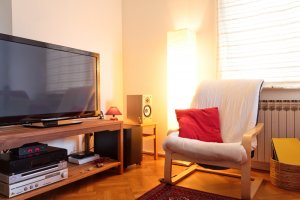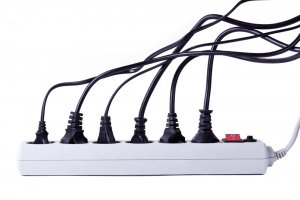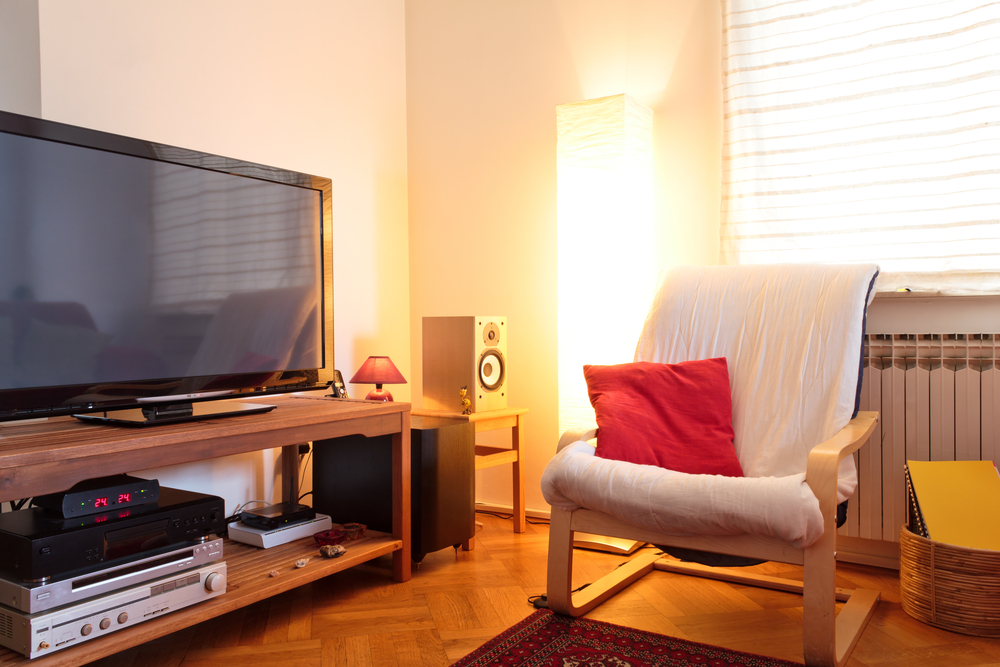Most people assume that appliances like refrigerators, air conditioners and water heaters are the big energy hogs in your home. And it’s true! Studies have shown that on average, these appliances account for the most annual energy use in kWh per year. But it’s not always easy to make the investment to get a new, energy-efficient water heater or fridge. There are easier ways to conserve energy, while you save up for these big purchases.
 Are you already careful to use major appliances in off-peak hours? Then you may need to find other areas within your home where you can reduce usage. In this blog, we’d like to take a look at one area with a huge number of potential opportunities for conservation: home electronics.
Are you already careful to use major appliances in off-peak hours? Then you may need to find other areas within your home where you can reduce usage. In this blog, we’d like to take a look at one area with a huge number of potential opportunities for conservation: home electronics.
Electronics like televisions and home entertainment systems are huge electricity users. They’re not on the same level as the others we’d mentioned, but they still account for a sizable portion of your home’s electricity bill. To help you save money, here are our 4 tips for reducing energy usage from electronics:
1. Make a Habit of Switching Off Your Electronics
It sounds obvious, but switching off is always the first step when you’re looking to save energy with electronics. Many people never get in the habit of turning off devices like desktop computers or printers and scanners. The simple click of a button can make a big difference over time—if you remember to do it consistently!
2. Pull the Plug on Stealth Energy Users (Or Use Power Bars)
Did you know that many devices still use electricity when they’re turned off? These stealth users can act like vampires for your home’s power grid, by drawing energy 24 hours a day. It doesn’t matter if they’re on or off! And many people don’t know about them.
 According to this article on the topic, the biggest “vampire” electronic products are:
According to this article on the topic, the biggest “vampire” electronic products are:
- DVRs (Digital Video Recorders)
- Digital cable systems
- Satellite systems
If you want to save energy, it’s important to pull the plug on stealth energy users—and most of your electronic devices count among them. To reduce the hassle of individually unplugging everything in your home entertainment system, try installing a power bar with an off-switch. Using the power bar’s off-function will cut electricity to these appliances, accomplishing the same result as unplugging them. Power bars are great solutions to the problem of “vampire” products.
3. Configure Your Device’s Energy-Saving Setting
 It’s common to leave devices like computer, tablets, and smartphones on for long periods of time. You probably spend a large percentage of your day using them. It’s not very convenient to keep turning them on and off.
It’s common to leave devices like computer, tablets, and smartphones on for long periods of time. You probably spend a large percentage of your day using them. It’s not very convenient to keep turning them on and off.
Instead of wasting time, why not configure your computer and other devices to hibernate automatically after a period of inactivity? In many cases, this is more energy-efficient than turning things off and on every few hours. For example, change your computer’s settings to hibernate after 10-15 minutes of inactivity and install battery saver apps on your phones like Greenify or Battery Doctor.
Remember to disable screensaver mode too—screensavers are another stealth energy user. If you want to save electricity, it’s best to avoid using them. Let your computer sleep instead!
4. Buy Energy-Efficient Products
Did you know that desktop computer and monitors tend to use more energy than laptops and notebooks? In addition to being convenient, there’s an ecological reason to buy these types of devices. Tablets use even less than laptops!
When you’re shopping for a new device, buy products marked with the Energy Star logo. Energy Star devices are proven energy-savers and employees should be able to help you find them!
If you’d like more suggestions on reducing energy usage in your home, get in touch! We’d be happy to help out.


Your post has a unique voice that sets it apart. It’s refreshing to read something different and engaging.